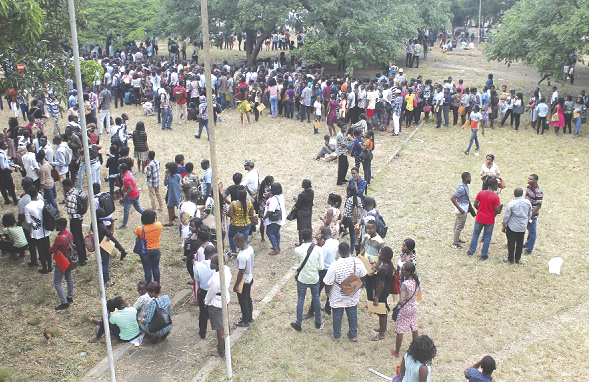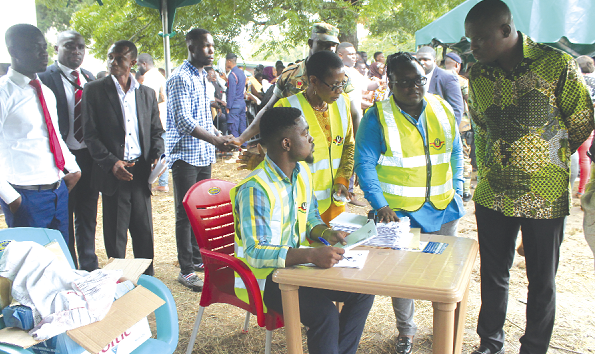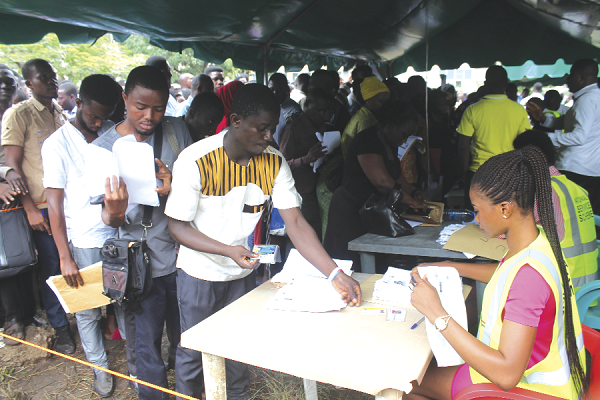For the first time in many years, national service persons have gone through the registration process and started their mandatory service without the usual brouhaha.
Unlike the previous years when hustle and bustle characterised the registration exercise, this year was largely devoid of ugly scenes.
The overwhelming numbers at registration centres, heavy presence of the police and military officers at the centres, cumbersome registration process and tensed atmosphere were virtually absent.
Also, the usual news headlines such as "NSS blues: user agencies reject service persons", "Soldiers maltreat service persons" and "long queues greet first day of NSS registration exercise" were absent this year.
For instance, the Daily Graphic carried an opinion piece titled “NSS blues: healing the wounds and erasing the scars” in its September 11, 2017 issue, discussing how long winding queues at registration centres conspired with slow processing of documents to frustrate hundreds of the prospective service persons.

The plight of some of the service persons was worsened when user agencies such as the Social Security and National Insurance Trust (SSNIT), Ghana National Petroleum Corporation (GNPC), Ghana Revenue Authority (GRA) and the Ghana Cocoa Board (COCOBOD) rejected their postings because of the overwhelming numbers.
It was an eyesore as many of the rejected service persons thronged the offices of the NSS for reposting to other user agencies.
Technology
The improvement in the NSS deployment and registration process this year can largely be attributed to the use of information and communications technology (ICT) and other innovations.

The Executive Director of the scheme, Mr Ussif Mustapha, explained in an interview recently that the use of modern technology and innovation was the secret weapon.
“This year, the NSS had a complete overhaul of our registration process by deploying the right technology to facilitate our processes.
We used online technology for biometric data capturing by linking our system to the central database which houses the data of state institutions such as the Passport Office, Driver and Vehicle Licensing Authority (DVLA), Social Security and National Insurance Trust (SSNIT) and the Electoral Commission (EC).
“Once we keyed in the details of the applicants for national service, their data popped up automatically and that made it easy for us to track the identity of all of them to check against impersonation,” he explained.
Touching on how the NSS managed to prevent the challenges that came with the mammoth crowd that thronged registration centres over the years, he had this to say: “Last year, the management of the scheme was not happy about crowd control and the challenges that came with registration, so this year, we introduced an appointment system for the prospective service persons to book an appointment online before they get to the registration centres.
“By this system, only a limited number of people are given appointment for each day and once they get to the centre, we have the QR code system that allows our officials to scan their data at the click of a button. They spend under five minutes to be registered,” he said.
Innovation
For instance, on July 18 this year, when the NSS announced the postings for the 2018/19 service year, Mr Mustapha disclosed that the postings of some 2,102 prospective service persons had been withheld because of some infractions that its robust tracking system had identified.
The move, he said, was to restore sanctity to the NSS which had been caught in the web of ghost persons on the scheme’s payroll. As of now, 633 of those people are still being investigated for allegedly using fraudulent means to apply for national service.
In addition, the management of the scheme rolled out an online application regime that made it possible for the prospective service persons to log onto a dedicated website and register.
Perhaps, the most innovative step taken by the management of the scheme is the introduction of the appointment system for crowd control.
In this system, the service persons were required to log onto the NSS website and book an appointment and be given a unique number and date before they report to registration centres.

This great initiative did not only ensure that only a minimum number of service persons reported to the registration centre daily, but also eliminated the long queues and pressure on the registration officials.
In a bid to address the issue of rejection by user agencies, the prospective NSS persons were required to seek the consent of the user agencies to which they had been posted before submitting the final document to the offices of the scheme for final approval.
Certificate delivery
Over the years, members of the public had to go through cumbersome processes to collect their national service certificates to be able to apply for jobs.
To address this challenge, the NSS management introduced online reforms to facilitate the delivery of the certificates.

The system has also been decentralised such that people do not have to travel to regional offices of the scheme to collect their certificates.
“Our certificates are now online, so by the click of a button, I can sit in the office here and know the number of certificates in the system and how many are being collected at any point in time,” Mr Ussif explained.
Some challenges
In spite of the huge gains that have been made in the registration process this year, there were reports of some challenges in the process.
Last year, many prospective service persons were turned away by the user agencies either because of the excess number or lack of the skills set required by those organisations.
Such rejections occurred this year again, but Mr Ussif said they were minimal as compared with that of last year.
“Some private organisations applied for service persons to be posted to them, thinking that the government would pay allowances for such persons but upon realising that they had to bear the cost, they made a U-turn.
“Many of the private organisations turned down the request for service persons because of changes in their budget. However, the NSS reposted all those people to other user agencies,” he added.
Conclusion
The initiatives by the NSS management may not have addressed all the challenges in the registration process, but certainly, they have greatly improved the system.
It is in the light of this that one can salute the management of the scheme for doing a Yeoman’s job. But like Oliver Twist, we ask for more.
BY: Timothy Ngnenbe


Comments